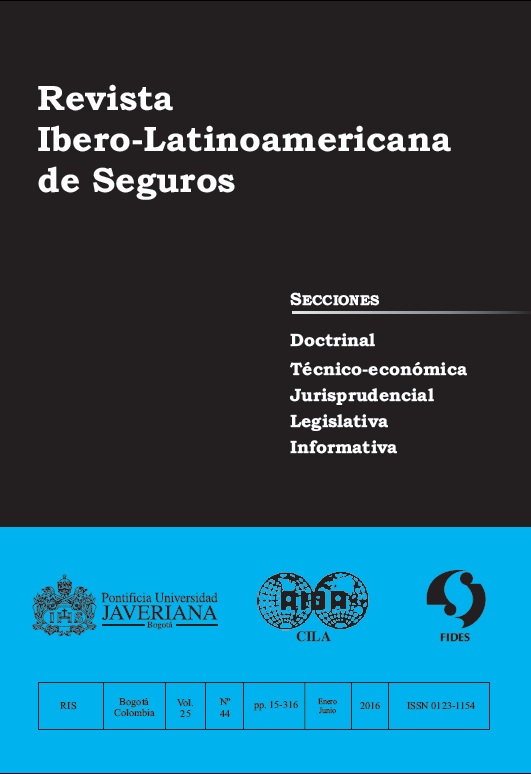Abstract
This study considers the insured party’s duties in a generic manner, as context for analyzing the prohibition in liability insurance of the insured to recognize his civil liability or arrive at agreements with third-parties. The general framework of law for the different duties of the insured during the execution performance of the insurance contract is studied, with special emphasis on the liability insurance contract, as this is
the type of insurance that carries the prohibition.
The way in which the insured party’s duties develop primary principles of the insurance contract, such as good faith and the indemnity principle, are analysed, thus identifying their nature and juridical consequences. Three different types of insured’s duties in the insurance contract are identified, distinguished by the temporary state of the risk in the aforementioned contract, be they: i) at the moment of transmitting the risk to the insurer, ii) the risk being assumed by the insurer, and iii) the risk having occurred while assumed by the insurer.
Risk is the random element in the insurance contract which gives it the unbroken chain character, so that the temporary state of the risk determines the behavior the parties involved must maintain during the execution and performance of the insurance contract, analyzing specifically the insured’s behavior as he is the recipient of the prohibition at issue.
In some Latin American legislations different consequences have been contemplated for the breach of this prohibition. , In Colombia, loss of the indemnity right is commonly assigned as a consequence; yet the prohibition without establishing a juridical consequence to its breach is also seen. This study proposes that in the Colombian legal system this consequence implies a penalty to bad faith in the insurance claim, therefore inadequate for the breach of the prohibition under discussion.
This study analyzes the effects of the insured’s breach of the prohibition of civil liability recognition and agreements with third-parties, proposing a consequence considered legally adequate attending to the nature of the insured’s prohibition.
This journal is registered under a Creative Commons Attribution 4.0 International Public License. Thus, this work may be reproduced, distributed, and publicly shared in digital format, as long as the names of the authors and Pontificia Universidad Javeriana are acknowledged. Others are allowed to quote, adapt, transform, auto-archive, republish, and create based on this material, for any purpose (even commercial ones), provided the authorship is duly acknowledged, a link to the original work is provided, and it is specified if changes have been made. Pontificia Universidad Javeriana does not hold the rights of published works and the authors are solely responsible for the contents of their works; they keep the moral, intellectual, privacy, and publicity rights.
Approving the intervention of the work (review, copy-editing, translation, layout) and the following outreach, are granted through an use license and not through an assignment of rights. This means the journal and Pontificia Universidad Javeriana cannot be held responsible for any ethical malpractice by the authors. As a consequence of the protection granted by the use license, the journal is not required to publish recantations or modify information already published, unless the errata stems from the editorial management process. Publishing contents in this journal does not generate royalties for contributors.


